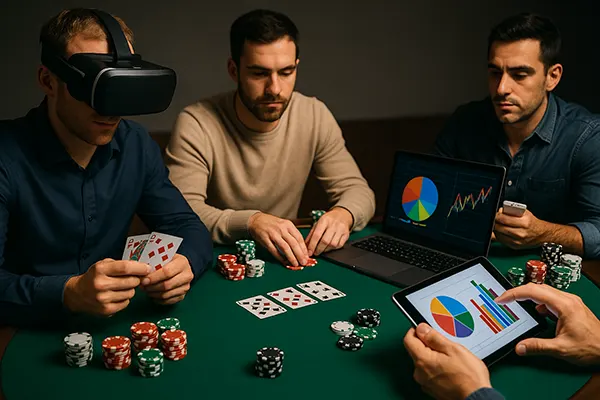Digital Assistants in Poker: How Trackers, Calculators and Trainers Are Transforming Online Play
Poker has always been a game that combines psychology, mathematics, and strategy. In 2025, the role of digital assistants has grown significantly, offering players new ways to approach the game. From tracking performance statistics to simulating difficult decisions, these tools have become an integral part of modern online poker. Understanding how they work and how they influence gameplay is essential for anyone who wants to remain competitive in today’s poker environment.
How Poker Trackers Enhance Decision-Making
Poker tracking software has been designed to collect and analyse vast amounts of data from every hand a player takes part in. By storing hand histories, these tools provide deep insights into betting patterns, tendencies, and long-term weaknesses. As a result, players can identify leaks in their strategies and adjust accordingly. Modern trackers also offer heads-up displays (HUDs), presenting real-time statistics during gameplay, which can be a decisive advantage when facing experienced opponents.
Another key benefit of trackers is their ability to benchmark a player’s results against the broader community. This feature allows users to assess whether their win rates are competitive and how they compare with averages in specific game formats. By leveraging this knowledge, players can better manage their bankroll and make informed decisions about which stakes or formats are most profitable for them.
In 2025, leading trackers integrate with both desktop and mobile applications, making it possible for players to review sessions seamlessly across devices. This flexibility ensures that performance analysis is no longer confined to a single screen or environment, but can be accessed and studied whenever convenient.
The Ethical Debate Around Trackers
While trackers are powerful tools, their use raises ethical and regulatory questions. Some poker rooms restrict or ban HUDs, arguing that they provide an unfair advantage and may discourage recreational players. In contrast, others allow their use, considering them part of the skill-building process. As regulations continue to evolve, players must stay updated on the rules of each poker room they join.
Another aspect of the debate concerns fairness. Some players argue that digital assistance diminishes the psychological side of poker, where intuition and observation once played a larger role. Critics suggest that the reliance on data shifts the game towards pure statistical optimisation rather than human strategy.
Nevertheless, many professionals defend trackers as legitimate tools for self-improvement. They stress that while software provides insights, decision-making ultimately rests with the player. Thus, learning to interpret statistics correctly remains a skill that separates successful players from average ones.
The Role of Calculators in Hand Analysis
Hand calculators are another widely used tool in modern poker. These programs evaluate odds, equity, and probability in real time, helping players understand the mathematical backbone of their decisions. By inputting ranges of possible hands, players can estimate how often they are likely to win a given scenario. This functionality has become especially valuable in fast-paced online environments where quick decisions are required.
Equity calculators also serve as educational resources for developing intuition. By repeatedly testing different situations, players gradually build a mental library of probabilities that can later be applied without direct assistance. This process is fundamental in shaping a mathematically sound strategy that withstands pressure at the table.
In recent years, calculators have evolved into more advanced solvers, which analyse game theory optimal (GTO) strategies. These solvers go beyond simple odds calculation by suggesting the best possible plays against balanced opponents. They have become central to professional training and are frequently used to study hands after a session.
Accessibility and Risks of Overreliance
While calculators and solvers are excellent study aids, they also carry the risk of overreliance. Some players mistakenly believe that memorising solver outputs is enough to succeed, neglecting psychological elements such as bluffing and table dynamics. This mechanical approach can limit adaptability when facing opponents who deviate significantly from theoretical play.
Another concern lies in the misuse of calculators during live online games. Many platforms explicitly forbid real-time solver use, considering it equivalent to cheating. Players caught using such tools in violation of terms risk account suspension and financial penalties.
Despite these risks, calculators remain one of the most valuable resources for poker education. When used responsibly, they strengthen analytical skills and prepare players for both competitive and recreational settings.

Trainers and Simulation Software
Poker training software has made learning more accessible than ever. These applications simulate real-life scenarios, allowing players to practise decision-making without financial risk. From pre-flop charts to post-flop drills, trainers provide structured exercises designed to reinforce optimal strategies and eliminate common mistakes. This makes them particularly useful for beginners looking to accelerate their learning curve.
Advanced trainers use artificial intelligence to adapt to the player’s style, offering customised feedback. By challenging users with increasingly complex scenarios, they mimic the unpredictability of real games while still guiding improvement. This feedback loop creates an efficient learning environment that rivals traditional coaching.
In 2025, some of the most popular trainers also integrate with VR and AR technology, creating immersive simulations. These environments replicate the intensity of live games, helping players improve their ability to manage emotions, read opponents, and maintain discipline under pressure.
The Future of Digital Poker Training
Looking ahead, poker training software is expected to merge more closely with data analysis and artificial intelligence. Future applications may combine real session histories with training exercises, producing personalised development plans tailored to individual weaknesses. This integration could redefine the way players approach self-improvement in poker.
Another anticipated development is the gamification of training. By incorporating achievements, leaderboards, and competitive drills, trainers are making practice more engaging. This trend encourages players to practise consistently, improving retention of knowledge and motivation to advance.
Finally, as regulation around online poker evolves, training software is likely to play a role in ensuring fair play. Some tools may be adopted officially by poker operators as educational resources to level the playing field for newcomers. This would help create a more balanced environment, benefiting both operators and the broader community.



